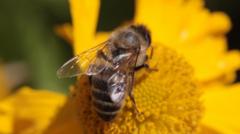An extraordinary incident unfolded in Aurillac, central-southern France, as a swarm of bees attacked passersby, leading to serious injuries. The local mayor reported that three victims are currently in "critical but stable condition," and 24 others sustained various injuries during the incident which occurred over the weekend. One of the injured, a 78-year-old woman, was stung multiple times and required resuscitation following a cardiorespiratory arrest.
Bee Frenzy in Aurillac Leaves Three Critical and Many Injured

Bee Frenzy in Aurillac Leaves Three Critical and Many Injured
A sudden bee attack in Aurillac, France, has resulted in three individuals in critical condition and multiple injuries among bystanders.
Eyewitness accounts from onlookers described scenes of panic as people attempted to fend off the angry swarm. A local resident named Andrée recounted observing the chaos, noting the confusion and fear among the crowd as they realized an unknown threat was at hand. Local officials responded quickly by securing the area and calling in a beekeeper to safely remove the bees using smoke, a common technique to calm such insects.
Aurillac's mayor, Pierre Mathonier, suggested that the attack may have stemmed from the presence of Asian hornets, which are known predators of honeybees. However, Christian Carrier, the regional beekeepers’ union president, expressed skepticism regarding this claim. He pointed out that bees typically avoid engaging when faced with threats and suggested instead that the incident might have arisen from an overcrowded hive. As bees can become aggressive if they feel their living conditions are compromised, Carrier indicated that stress-induced behavior could potentially trigger such an unexpected attack.
This incident underscores concerns about the behavior of bee colonies under pressure and highlights the often overlooked dangers posed by these integral yet sometimes volatile creatures.
Aurillac's mayor, Pierre Mathonier, suggested that the attack may have stemmed from the presence of Asian hornets, which are known predators of honeybees. However, Christian Carrier, the regional beekeepers’ union president, expressed skepticism regarding this claim. He pointed out that bees typically avoid engaging when faced with threats and suggested instead that the incident might have arisen from an overcrowded hive. As bees can become aggressive if they feel their living conditions are compromised, Carrier indicated that stress-induced behavior could potentially trigger such an unexpected attack.
This incident underscores concerns about the behavior of bee colonies under pressure and highlights the often overlooked dangers posed by these integral yet sometimes volatile creatures.





















